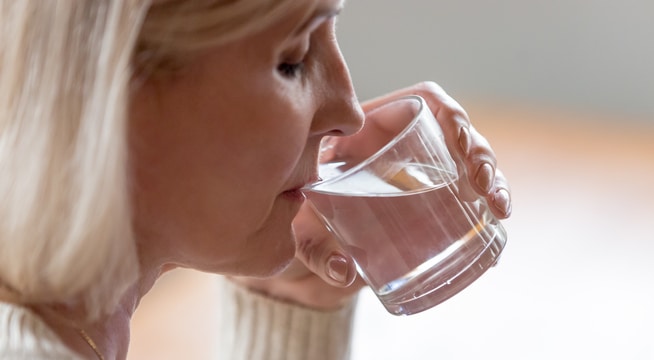Emergency Room IV Fluids for Dehydration
Dehydration
•
Mar 6, 2020

There are several things that come to mind when most people think about dehydration. These may include hot summer days, not drinking enough water, and over-exercising without replenishing electrolytes. But, do you know what happens to the body when it’s dehydrated? And, do you know how to recognize symptoms? When can it be relieved by drinking fluids, and how do you know if you need to go to the Emergency Room?
What is dehydration?
Dehydration occurs when the body loses more fluid than what it needs to function properly. While it’s normal to lose fluids through sweating, spitting, urinating, and bowel movements, the body replaces lost fluids by drinking and eating foods that contain water.
Dehydration can happen to any age group, and it can be the result of not drinking enough water — especially when in hot weather — overexertion, increased urination, severe diarrhea, vomiting, or infections.
People at a higher risk of dehydration include infants and children — since they can’t often tell you when they’re thirsty — as well as people with chronic health conditions, such as uncontrolled diabetes or kidney disease. And, if you live in a hot climate and exercise outside, dehydration is more likely if you fail to drink enough fluids.
Signs of Dehydration
While thirst is an indication that your body needs water, experiencing it occurs when you’re already dehydrated. Therefore, it’s crucial to learn to recognize symptoms that you need to increase your water intake. These include:
- Dry mouth
- Infrequent urination
- Dark-colored urine
- Dry, cool skin
- Headache
- Muscle cramps
When to go to the ER
You should seek immediate medical care if you experience symptoms of severe dehydration. In addition to the symptoms listed above, more serious dehydration cases include the following:
- Rapid heartbeat
- Sunken eyes
- Dizziness
- Confusion
- Lack of energy
- Irritability
- Poor skin elasticity — if you pinch it, it goes back to its original position slowly
Also, see your doctor if you’ve had diarrhea for more than 24 hours, can’t keep fluids down without vomiting, or if you have bloody or black bowel movements. Failing to do so may lead to complications such as heat stroke, hypovolemic shock, seizures, and/or kidney failure.
If the person experiencing severe dehydration was exercising outside in hot temperatures or has a high fever, seek treatment on an emergency basis. If the body temperature reaches 104 F (40C) or more, it could lead to permanent brain damage — or even death.
Does The Emergency Room give IV fluids?
Yes. Emergency rooms can provide IV fluids for patients experiencing severe dehydration. If you or a loved one are in this situation, an IV treatment will provide relief with the hydration being inserted directly into a vein. By doing so, the fluids, vitamins, and electrolytes go directly into the bloodstream instead of having to wait for your body to metabolize it through the gastrointestinal tract. As a result, vital organs such as the liver and kidneys receive an increased blood supply at a much faster rate.
24-Hour Emergency Room Services in Colorado Springs and Texas
If you are dehydrated, our Emergency Rooms can provide you with the care you need. If you have questions or need immediate treatment, your nearest Complete Care Emergency Room location is ready to help, no matter the time of day or night. We offer a variety of services to help you and your family in your time of need. No appointments are necessary.
Find the Complete Care Emergency Room location nearest you.